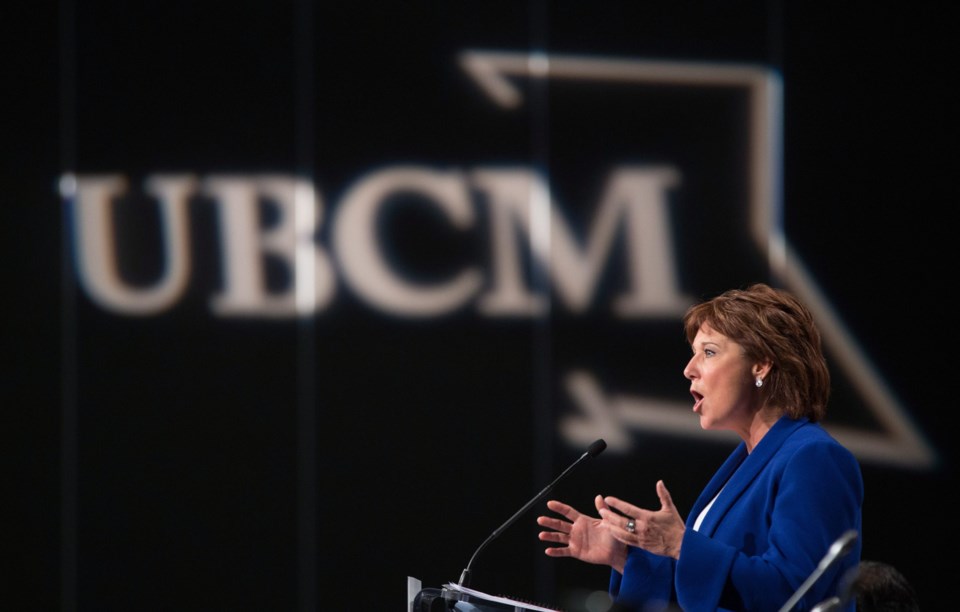 People look to leaders for hope and optimism, Premier Christy Clark said Friday.
People look to leaders for hope and optimism, Premier Christy Clark said Friday.
In the context of her remarks — the wind-up speech to delegates at the Union of B.C. Municipalities convention — people also look to them for money. Lots and lots of money.
She did her best to provide all three. There was the confident use of the past tense in describing tough economic times. There was a vivid picture of B.C. as an emerging tech hub for Information Age brand names like Sony and Amazon. And $180 million was put on the table in the space of a half-hour. Most of it will be disbursed among the small communities the majority of the audience represents, which explains the standing ovation. They’ll be lining up in droves to apply for the money.
It’s been a while since a premier threw money around the UBCM so enthusiastically. The funding promises, along with the hopeful rhetoric, suggest the B.C. Liberals are moving away from the frugal “just say no” approach to government that has characterized the past several years.
Clark and Finance Minister Mike de Jong are still citing austerity as the main driver for B.C.’s balanced budgets and portraying themselves as hawk-eyed guardians of the government credit cards. But there’s more discretionary money around now than there used to be.
“B.C. is really thriving, not just in the urban centres but all over,” Clark told the delegates. “We’re starting to see economic growth really thrive in the province. We’re starting to see those first LNG projects take shape … rural communities are really coming back.”
She said the singular achievement of B.C. over the recent past has been to balance three budgets in a row, with at least two more forecast.
“We had a plan and we stuck to it, and that plan is now bearing fruit.”
She noted the difficulties in getting through uncertain times. “But we’ve done it.”
Referring to all the sacrifices made, she said: “Now it’s time to talk about finding the dividend from all that hard work.”
That’s when the chequebook came out.
Based on the work of a rural advisory council, Clark put $75 million into a “rural dividend” fund. Communities under 25,000 population can apply for up to $25 million a year for the next three years to “reinvigorate and diversify” local economies.
The latest version of the federal-provincial small communities fund was also touted. It will be a jointly funded $90-million pool, from which communities under 100,000 population can draw for infrastructure building.
Infrastructure was a separate theme in the premier’s speech. The Liberals’ job creation drive was always based on the private sector, but Clark is now touting infrastructure — as in public sector — as a major job creator. Public construction will provide 150,000 jobs over the next decade, 10,000 alone at the Site C dam, she said.
That’s driven by steady increases in public debt ($65 billion and climbing), although Clark preferred to highlight the one small portion of debt — operating debt — that is shrinking.
“That is where a debt-free B.C. begins,” she said, referring to the 2103 campaign theme.
Rounding out the goodies list was another $5 million committed to the guns-and-gangs strategy to curb street violence over the next two years, and $10 million more for wildfire prevention, with more to come next year.
Just So You Know: With all the uplifting talk and money flowing around, there was enough goodwill around that Clark could afford to take a direct shot at opponents of the Site C dam. Delegates passed a resolution protesting the dam before her speech.
“I know there are some of you who oppose Site C as much as I passionately support doing it. I understand your position, what I don't understand is the position of those who say they don’t have the courage to take a position. It is not leadership to say on the biggest infrastructure project in B.C. history … you’re just not sure.”
It was aimed as much at the NDP as it was at critics in the room, and amounts to a warm-up swing for the resumption of the legislative session on Monday.



